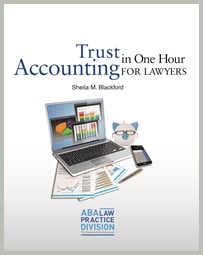Well-meaning lawyers who struggle to balance their personal checking account may think the safest way to protect their client trust account is to find a knowledgeable bookkeeper or CPA to take charge of it. In practice, though, this can add up to an ethics violation for shirking responsibility to properly manage the trust account.
The problem arises when the lawyer doesn’t merely delegate responsibility but actually abdicates responsibility for the trust account. What is the difference? Let’s look at two lawyers in action and inaction.
Bringing in the Bookkeeper
John has hired Karen, an experienced bookkeeper, to track all deposits to and withdrawals from his trust account using QuickBooks. Initially, John tracked each client’s trust account funds, but realized that doing it by hand was not efficient or error-free. His CPA recommended he hire a bookkeeper experienced in using QuickBooks to manage a law firm trust account. After interviewing a number of candidates, he hired Karen, who is very familiar with setting up individual sub-accounts to properly track each individual’s trust account.
Karen clearly understands that money deposited on behalf of a client needs to be actually collected and in the trust account before writing any checks, or else the check will be drawing down funds belonging to a different client. Assured that the funds have been collected by John’s bank, Karen writes checks from three different client trust sub-accounts and presents the checks with the underlying invoices along with each client’s ledger card report showing all the transactions and current balances. John reviews the documentation for each expense and each respective client ledger card report. Finding everything in order, he signs the checks and initials the report at the line item.
Karen then goes over a three-way reconciliation of the overall trust account: After adding the balances of all of the client ledgers, she compares this total balance of all the client sub-accounts with the total balance of the overall trust account. The total balance of the overall trust account is determined by reviewing the trust account journal of transactions, which, like a checkbook register, provides a record of all deposits and withdrawals. Karen then reconciles the trust account monthly bank statement by adding outstanding deposits not yet credited to the account and subtracting outstanding deposits not yet cleared. The three balances must be the same: total of client ledgers, trust journal of transactions, and reconciled trust account bank statement. All three numbers equal each other so Karen and John are confident the client trust account is in order.
Although John has delegated the details of trust accounting in QuickBooks to his bookkeeper, he consistently reviews her work. He does not write a single check without verifying that the charge is accurate and that there is adequate trust account money held on behalf of the specific client for whom the check will be written. Otherwise, John could be using money belonging to another client to cover the expense.
Meanwhile, On Another Floor …
Stacy is a solo practitioner like John, but she handles her trust accounting differently. Realizing that she has no aptitude for handling bank accounts, she has entrusted her law clerk, Jacob, with handling her bookkeeping.
Jacob is very smart but had never used QuickBooks or handled a trust account before being hired six months ago. Jacob carefully follows the directions. He notates what each trust account check is written for in the memo field, but he does not separately track each client trust sub-account.
Jacob has never done a three-way reconciliation but he looks at the bank statement and reviews the online account balance before paying any invoices from the trust account. Stacy believes that as long as the trust account balance in QuickBooks is compared to the trust account bank account statement that Jacob is doing everything right. As long as the bank and her trust account are in balance, she is happy.
Last month,however, something went wrong and Jacob could not get the two numbers to equal. Stacy told him to just use the balance the bank showed. Accordingly, Jacob made a trust account reconciliation adjustment to correct a bookkeeping error.
Stacy is too busy practicing law to handle the billing and banking. Jacob thinks he is doing too much bookkeeping and not enough legal work.

Monitor and Protect Your Clients’ Property
Trust accounting not done well is one of the fastest ways to becoming subject to discipline, suspended or disbarred. Use a bookkeeper, but review the work. Delegate duties, but monitor work. Ultimately, you must remain responsible and accountable for protecting your client’s property.
Illustration ©iStockPhoto.com
Subscribe to Attorney at Work
Get really good ideas every day: Subscribe to the Daily Dispatch and Weekly Wrap (it’s free). Follow us on Twitter @attnyatwork.

















